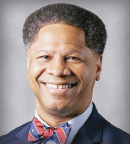
Robert Winn, MD
The Bristol Myers Squibb Foundation and National Medical Fellowships recently announced their new partnership, which is aimed at improving diversity in clinical trials. Leveraging $100 million of the previously announced commitment to diversity and inclusion from Bristol Myers Squibb and the Bristol Myers Squibb Foundation, the partnership will develop a program to extend the reach of clinical trials into underserved patient populations in urban and rural U.S. communities.
This program will train and develop 250 new clinical investigators who are racially and ethnically diverse or who have a demonstrated commitment to increasing diversity in clinical trials, and it will expose 250 promising, underrepresented minority medical students across the country to clinical research career pathways. Additionally, the program will assist investigators in building capacity and standing up new clinical trials sites in communities with diverse and heavily burdened patient populations.
Need for Diversity in Clinical Trials
“Clinical research is necessary to generate evidence demonstrating the efficacy and safety of new treatments,” said Robert Winn, MD, Director, Massey Cancer Center, Virginia Commonwealth University, who is serving as Chair of the National Advisory Committee of the Bristol Myers Squibb Foundation Diversity in Clinical Trials Career Development Program. “While the patient response to medical therapies may differ across racial and ethnic subgroups, clinical trials often fail to represent the demographic diversity of the populations these products aim to serve.”
In fact, aggregated data on the racial and ethnic participation in clinical trials published by the U.S. Food and Drug Administration show that in general, 80% of patients taking part in clinical trials are White. Black Americans represent approximately 13% of the U.S. population but only reflect about 7% of participants in clinical trials.
The goal of the Bristol Myers Squibb Foundation Diversity in Clinical Trials Career Development Program is to increase diversity of patients enrolled in clinical trials and ultimately to enhance the development of therapeutics for all populations. The program will collaborate with communities to facilitate an approach to clinical and translational research that is community-informed, designed, and conducted.
How to Apply
Applications will open in January 2021. Eligible candidates will hold the degree of MD, MD/PhD, DO, or DO/PhD and have an interest in clinical research in the areas of cancer (hematology and oncology), cardiovascular disease, and immunologic disorders. In addition, they will reflect the National Institutes of Health (NIH) definition of early-stage investigator and the NIH definition of underrepresented populations in the U.S. Biomedical, Clinical Behavioral, and Social Sciences Research Enterprise or have a demonstrated commitment to increasing diversity in clinical trials. To learn more about eligibility and program details, e-mail DCTCDPinfo@nmfonline.org.

